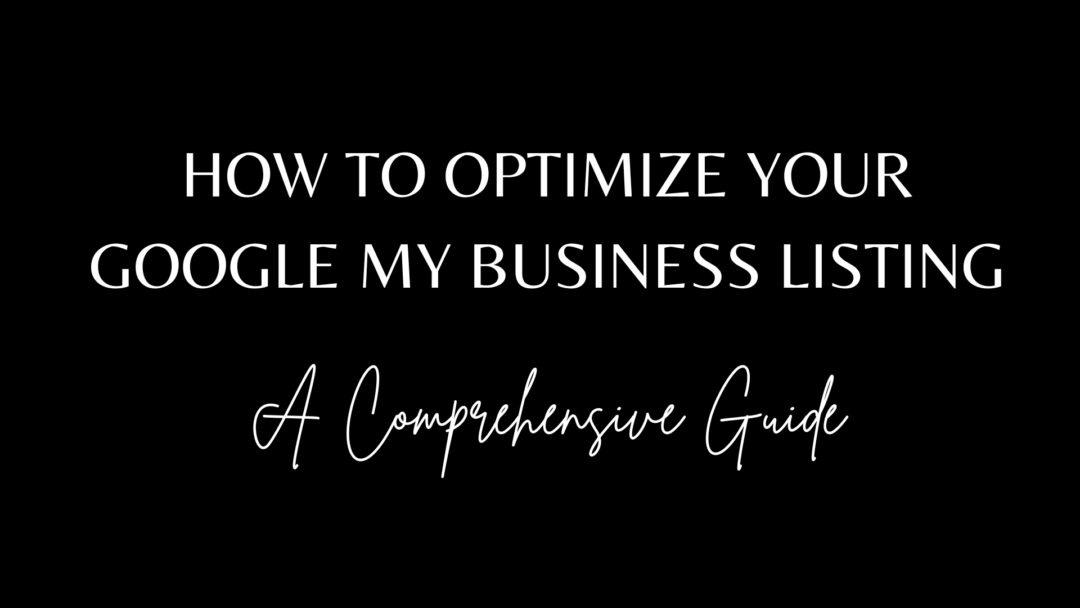In today’s digital age, having an online presence is crucial for any business, especially for small businesses and startups. One of the most effective ways to enhance your online visibility is by optimizing your Google My Business (GMB) listing. This guide will walk you through the process of optimizing your GMB listing to attract more customers and improve your local SEO.
Table of Contents
- Introduction
- Why Google My Business Matters
- Setting Up Your Google My Business Account
- Optimizing Your Business Information
- Utilizing Photos and Videos
- Managing and Responding to Reviews
- Leveraging Google My Business Posts
- Utilizing Insights and Analytics
- Advanced Tips for Optimization
- Common Mistakes to Avoid
- Conclusion
- Additional Resources
1. Introduction
Google My Business (GMB) is a free tool that allows businesses to manage their online presence across Google, including Search and Maps. By optimizing your GMB listing, you can improve your business’s visibility, attract more customers, and ultimately drive more sales.
2. Why Google My Business Matters
GMB is essential for local SEO. When potential customers search for products or services in their area, Google often displays a local pack of businesses related to the search query. Having a well-optimized GMB listing increases your chances of appearing in these local search results, driving more traffic to your business.
Benefits of Optimizing Your GMB Listing
- Improved Visibility: Appear in local search results and on Google Maps.
- Increased Engagement: Provide customers with essential information, photos, and updates.
- Enhanced Credibility: Collect and showcase customer reviews.
- Better Insights: Access valuable data on customer interactions.
3. Setting Up Your Google My Business Account
To start optimizing your GMB listing, you first need to set up your account. Follow these steps:
Step 1: Create or Claim Your Business
- Go to Google My Business.
- Sign in with your Google account or create one.
- Enter your business name and address. If your business is already listed, claim it.
- Verify your business by following the on-screen instructions.
Step 2: Complete Your Business Profile
- Business Name: Ensure it matches your business’s real-world name.
- Address: Provide your exact business location
- Phone Number and Website: Include your primary contact number and website URL.
- Business Category: Select the most relevant category for your business.
4. Optimizing Your Business Information
Accurate and detailed business information is crucial for both customers and search engines. Here’s how to optimize your business details:
Business Description
Write a compelling business description that includes relevant keywords. Describe your products or services, your mission, and what sets you apart from competitors. Keep it concise and engaging.
Business Hours
Ensure your business hours are accurate and up-to-date. If you have special hours for holidays or events, update them accordingly.
Attributes
Add relevant attributes to your listing, such as “Wi-Fi available,” “Wheelchair accessible,” or “Outdoor seating.” These attributes help customers make informed decisions.
Service Areas
If your business serves multiple locations, specify your service areas. This helps your listing appear in searches for those areas.
5. Utilizing Photos and Videos
Visual content is a powerful tool for attracting and engaging customers. According to Google, businesses with photos receive 42% more requests for directions and 35% more click-throughs to their websites.
Adding Photos
- Profile and Cover Photos: Use high-quality images that represent your brand.
- Interior and Exterior Photos: Showcase your business location.
- Product Photos: Highlight your products or services.
- Team Photos: Introduce your staff to build trust.
Adding Videos
Videos can provide a dynamic view of your business. You can upload videos showcasing your products, services, customer testimonials, or behind-the-scenes content.
6. Managing and Responding to Reviews
Customer reviews play a significant role in local SEO and can influence potential customers. Encourage satisfied customers to leave positive reviews and respond to all reviews, whether positive or negative.
Responding to Reviews
- Positive Reviews: Thank the customer for their feedback and encourage them to visit again.
- Negative Reviews: Address the customer’s concerns professionally and offer to resolve the issue.
7. Leveraging Google My Business Posts
GMB posts allow you to share updates, promotions, events, and more directly on your listing. These posts appear in your Knowledge Panel and can help drive customer engagement.
Types of Posts
- What’s New: Share general updates or news.
- Events: Promote upcoming events.
- Offers: Highlight special deals or promotions.
- Products: Showcase specific products.
Best Practices for GMB Posts
- Use High-Quality Images: Attract attention with clear, high-resolution images.
- Include a Call to Action: Encourage customers to take action, such as “Learn More,” “Call Now,” or “Visit Us.”
- Keep It Short and Sweet: Be concise and to the point.
8. Utilizing Insights and Analytics
GMB provides valuable insights into how customers find and interact with your listing. Use this data to make informed decisions and optimize your listing further.
Key Metrics to Monitor
- Search Queries: See what keywords customers use to find your business.
- Customer Actions: Track how many customers visit your website, request directions, or call your business.
- Photo Views: Monitor how often your photos are viewed compared to similar businesses.
- Popular Times: Understand when customers are most likely to visit your business.
9. Advanced Tips for Optimization
Utilize Q&A Feature
The Q&A feature allows customers to ask questions about your business. Monitor this section regularly and provide accurate and helpful answers.
Create a Custom Short Name
Create a custom short name for your GMB listing to make it easier for customers to find and share your business.
Use Google Posts to Promote Events and Offers
Regularly update your GMB listing with posts about events, promotions, and offers to keep customers engaged and informed.
Add Products and Services
If applicable, add a detailed list of your products and services to your GMB listing. This helps customers understand what you offer and improves your chances of appearing in relevant searches.
Enable Messaging
Enable the messaging feature to allow customers to contact you directly through your GMB listing. Respond promptly to inquiries to enhance customer satisfaction.
10. Common Mistakes to Avoid
Inconsistent Information
Ensure that your business name, address, and phone number (NAP) are consistent across all online platforms. Inconsistencies can confuse customers and harm your SEO.
Neglecting Reviews
Ignoring customer reviews, especially negative ones, can damage your reputation. Always respond to reviews and address customer concerns professionally.
Using Incorrect Categories
Choosing irrelevant categories for your business can mislead customers and negatively impact your SEO. Select the most accurate categories that describe your business.
Overlooking Insights
Failing to monitor GMB insights means missing out on valuable data that can help you optimize your listing. Regularly review insights and adjust your strategies accordingly.
11. Conclusion
Optimizing your Google My Business listing is essential for improving your online presence, attracting more customers, and driving business growth. By following the steps outlined in this guide, you can create a robust GMB profile that stands out in local search results.
Remember to regularly update your listing, respond to reviews, and leverage the various features offered by GMB to keep your customers engaged and informed. With a well-optimized GMB listing, your small business or startup can thrive in today’s competitive digital landscape.
12. Additional Resources
- Google My Business Help Center
- Moz’s Guide to Google My Business
- Search Engine Land’s GMB Optimization Tips
By utilizing these resources and implementing the strategies discussed in this guide, you’ll be well on your way to mastering Google My Business optimization and boosting your local SEO.

